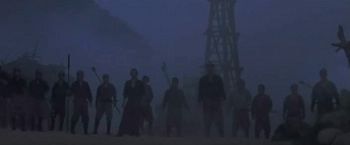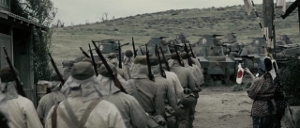
Remakes don’t have to suck. Admittedly, a lot of them do, but there’s a critical concept you might’ve heard of called Sturgeon’s Law, most commonly articulated as “ninety[-insert number here] percent of everything is crap.” If I may paraphrase the writer of more short stories than you or I will ever write and the original Star Trek episode “Amok Time,” remakes simply conform to the same trends of quality as all other art forms. It’s not pretty, but we live in a beautiful, ugly world, as the director of tonight’s film well knows. A world where genuinely good filmmakers with interesting, original visions have to churn out remakes before major studios risk financing anything original.
So 13 Assassins is a remake of a 1963 film of the same name, distributed by the house Godzilla built, Toho. It’s made by people who got famous riding the international wave of love Japanese horror movies surfed into the New Millennium. It’s screenwriter, Daisuke Tengan, wrote The Eel, which is a fucked-up movie, and Audition, a movie scientifically designed to fuck you up. Director Takeshii Miike went on from Audtion to Ichi The Killer, the Dead or Alive trilogy. Neither one of them would be my first choice for a period piece samurai drama. Never mind a remake of one that already exists.
Yet that’s just what they made and, not only does it not suck, it’s actually one of the better remakes of 2010. Much was made of the Cohen’s True Grit, but did Rooster Cogburn and Mattie Ross ever once mow down a street full of samurai in their quest to bring Tom Chaney to justice? No. No they did not. Point goes to 13 Assassins. Continue reading 13 Assassins (2010)

 World War II films and I have an understanding: I don’t watch them and they can go on propping up whatever brand of historical whitewashing is popular at moment. Rare is the film that consciously sets out to subvert the usual tropes of their perpetually John Wayne genre, or the deification of Tom Brokaw’s “Greatest” Generation. Whenever such a film emerges from the vacuous, exploitative, corporatist, Hollywood hive it is duly acknowledged by critics, nodded at by the Academy Awards…and promptly forgotten about. Case in point:
World War II films and I have an understanding: I don’t watch them and they can go on propping up whatever brand of historical whitewashing is popular at moment. Rare is the film that consciously sets out to subvert the usual tropes of their perpetually John Wayne genre, or the deification of Tom Brokaw’s “Greatest” Generation. Whenever such a film emerges from the vacuous, exploitative, corporatist, Hollywood hive it is duly acknowledged by critics, nodded at by the Academy Awards…and promptly forgotten about. Case in point: Looking back, Gamera’s rebirth was almost inevitable. History repeats itself and the movie industry eats its dead. Inspired by the success of the modern Godzilla films (beginning with 1984’s Godzilla and ending, on a dower, cliffhanger-note in 1995’s Godzilla vs. Destroyah), Daiei brought their own terrible terrapin out of retirement exactly nine months before Godzilla’s (latest) death. In black and white, as I’ve mentioned, Gamera can be somber, dynamic, dark…creepy in his own, lantern-eyed way. But the advent of cheap color film technology was no friend to the Friend to Children Everywhere.
Looking back, Gamera’s rebirth was almost inevitable. History repeats itself and the movie industry eats its dead. Inspired by the success of the modern Godzilla films (beginning with 1984’s Godzilla and ending, on a dower, cliffhanger-note in 1995’s Godzilla vs. Destroyah), Daiei brought their own terrible terrapin out of retirement exactly nine months before Godzilla’s (latest) death. In black and white, as I’ve mentioned, Gamera can be somber, dynamic, dark…creepy in his own, lantern-eyed way. But the advent of cheap color film technology was no friend to the Friend to Children Everywhere.